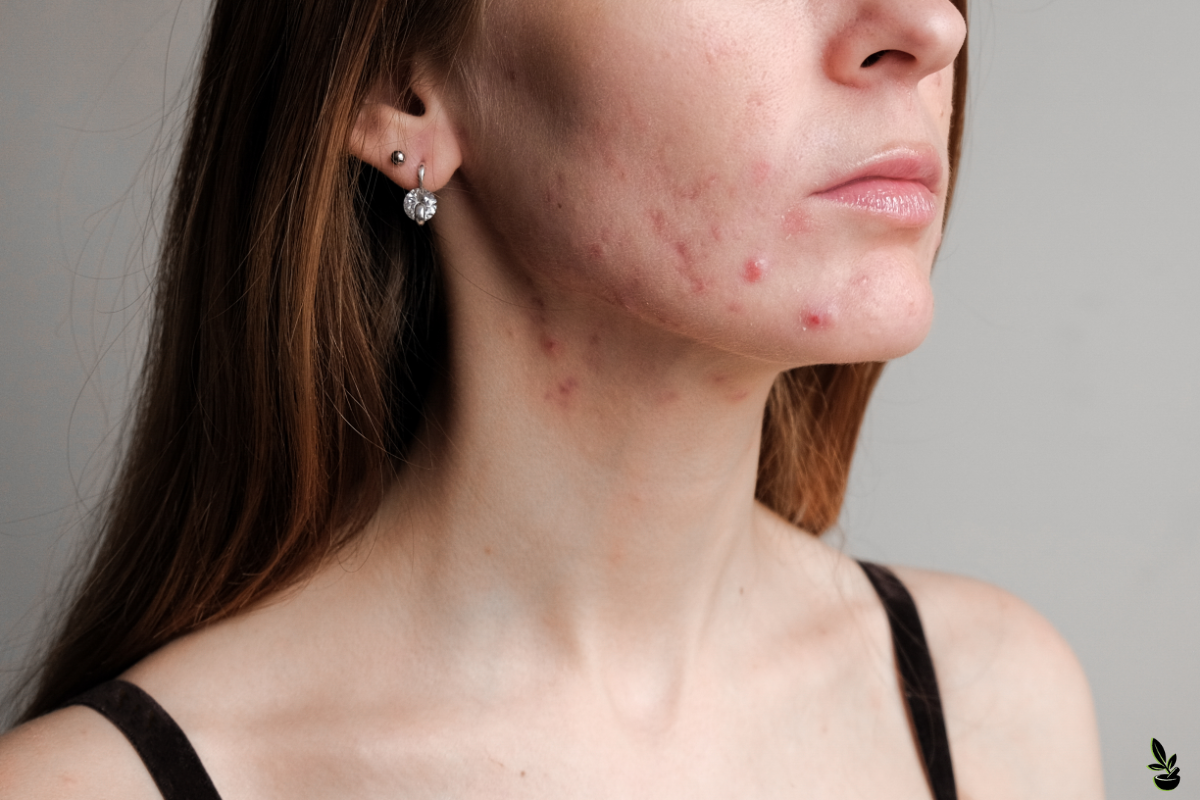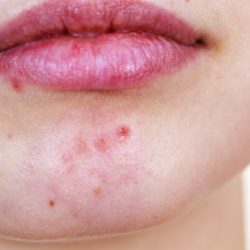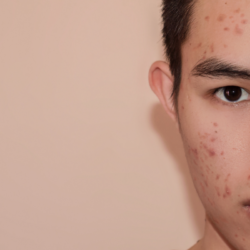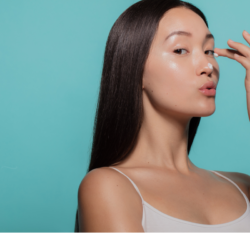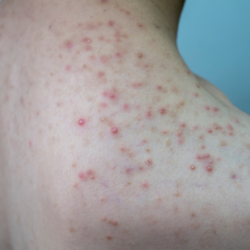Adult acne, microcysts, hormonal acne, blackheads…. Even so, around 50% of 20-40 year-olds are prone to regular outbreaks. Acne affects women more than men, regardless of age. And it’s only natural! Pimples develop under the influence of hormones, a much more regular phenomenon in women.
Teenage acne is mainly due to hormones. The sudden increase in hormones activates the sebaceous glands, which are responsible for your skin type – oily, dry or combination. As a result, they produce excess oil, making your tissues greasy. This oil clogs your pores, preventing them from breathing and inviting acne pimples to take hold.
What causes adult acne?
One of the main reasons is hormones. Your hormones are responsible for the development of our sebaceous glands at puberty, but also for the production of sebum. These hormones continue to fluctuate throughout your life, and that’s perfectly normal! This is why adult women are more affected than men. This is known as hormonal acne.
However, there are other factors that can encourage acne:
- Sweating:
Just as the fatty layer clogs your pores during adolescence, sweating also suffocates them.
- Poor diet:
An excess of refined sugar and bad fats…. will overload your liver with toxins. When the liver is no longer able to play its role as an emunctory, it sends the toxins to another organ that also acts as a filter: our skin.
- Stress:
The sebaceous glands are very sensitive to substance P and corticoliberin, two neurotransmitters produced in the event of stress by the neurons present in the cutaneous nervous network.
- Unsuitable skin care :
A beauty routine that is too aggressive, too rich or not adapted to your skin type can lead to imperfections and intensify acne.
Is your diet responsible for your adult acne?
It’s well established that diet influences our general well-being, but what about its impact on acne? Scientific studies are increasingly looking into this question, and some of them highlight the crucial role played by certain foods in managing inflammation and acne outbreaks.
Which foods aggravate inflammation and acne?
Research indicates that foods with a high glycaemic index such as refined sugar or simple carbohydrates can exacerbate inflammation, leading to acne breakouts. Similarly, dairy products, particularly cow’s milk, should be avoided because of their potential to stimulate the production of sebum and inflammation, thus contributing to skin eruptions.
The role of fatty acids in skin health
Omega-3 fatty acids, found in oily fish and certain seeds such as chia and linseed, are renowned for their anti-inflammatory properties. Incorporating these nutrients into your diet could therefore help to reduce systemic inflammation and, by the same token, the incidence of acne.
What about antioxidants?
Antioxidants, found in abundance in colourful fruit and vegetables, nuts and whole grains, are precious allies in the fight against oxidative stress and skin damage. A diet rich in antioxidants could therefore contribute to healthier skin that is less prone to imperfections.
Can excess sugar and carbohydrates aggravate adult acne?
A diet rich in sugar and carbohydrates with a high glycaemic index is often blamed for the onset and worsening of acne. According to a systematic review published in JAAD International in 2022, the impact of our diet on acnegenesis, the process by which acne is formed, is no longer to be taken lightly.
The consumption of dairy products has also been studied, although the results are less homogeneous and seem to depend on factors such as gender, ethnicity and cultural eating habits. However, the association between a high daily glycaemic load and acne has been clearly established, supported by randomised controlled trials. These studies suggest that diets with a high glycaemic load may act on hormones such as insulin and insulin-like growth factor 1 (IGF-1), as well as on androgens, thereby exacerbating acne.
It is therefore advisable to opt for foods with a low glycaemic index and reduce refined sugars to manage acne. Paying particular attention to the quality of carbohydrates consumed could have a beneficial effect not only on the skin, but also on overall hormonal balance.
Is pollution responsible for adult acne?
In our quest for blemish-free skin, we often tend to point the finger at our diet or skincare routine. But did you know that the enemy could well be hiding in the air we breathe? Yes, pollution is suspected of playing a role in the deterioration of our skin quality and the appearance of acne.
What impact do endocrine disruptors have on acne-prone skin?
Endocrine disruptors are everywhere: in the air, in our everyday products and even in our water. These sneaky substances can mimic or disrupt the way our hormones work, and by the same token, the way our sebaceous glands work. The result? Excess sebum production and an increased risk of clogged pores.
Is air pollution responsible for adult acne?
Recent studies tell us yes. The fine particles in air pollution don’t just float in the air, they seep into our pores, causing inflammation and oxidative stress. These two reactions of our skin are not harmless: they can significantly increase the risk of acne.
What can I do to combat the effects of pollution on my skin?
Fortunately, you don’t have to live under a dome to protect your skin. Simple gestures such as deep cleansing and using products containing antioxidants can provide a real shield against the harmful effects of our modern environment.
What can be done about hormonal acne?
Acne is often hormonal. This is explained by hormone fluctuations, which are common in women during menstruation, pregnancy or the menopause. For men, it’s different. Testosterone, the male hormone, fluctuates much less, which is why adult men have far fewer pimples: their hormones are more stable.
As a result, for many women, the week before their period is the most favourable time for skin imperfections to appear, although some see the quality of their skin deteriorate with the onset of menstruation or even during the ovulation period.
To get rid of your hormonal acne, it’s important to rebalance your body:
- Clean your body from the inside out:
With draining plants: a mixture of burdock/root nettle plants to be taken as a 3-month course of treatment will help your skin to regulate itself.
- Support your body:
Thanks to the contribution of trace elements such as zinc and selenium are recognised today as some of the most effective remedies in the treatment of adult acne. They combat both inflammation and the proliferation of bacteria.
- Eliminate all products containing comedogenic ingredients:
Choose skincare products labelled “non-comedogenic”, or better still, learn to decipher the composition of your skincare products yourself. Avoid silicones, which clog pores, and overly aggressive products, which dry out your skin and encourage the overproduction of sebum.
Does the sun heal acne spots?
The sun’s influence on acne is multifaceted. A measured dose of sunlight can have a beneficial effect on acne by drying lesions and evening out skin tone. In addition, the synthesis of vitamin D, encouraged by the sun, plays a key role in skin health. However, overexposure can do more harm than good. In fact, by excessively drying the skin, the sun can induce an overproduction of sebum, which can worsen acne. UV rays can also cause skin damage, resulting in a thickening of the skin that can clog pores and encourage blackheads. So it’s vital to balance sun exposure and use appropriate sun protection to control acne.
In a nutshell
Adult acne can be caused by a number of factors, but very often readjusting your lifestyle will help you to regain healthy, blemish-free skin.
To get rid of your acne, we recommend :
- Take a detox cure:
To cleanse your body and allow your skin to play its role as an organ of elimination.
- If necessary, readjust your diet:
Eliminate refined sugar and processed products that will “clog up” your body. Limit your consumption of dairy products, as they are not our lifelong friends. If you suffer from severe acne, also eliminate gluten for 3 weeks. Remember, acne is an inflammatory skin disease. All these foods are inflammatory, so they encourage the appearance of pimples.
- Protect your skin from the sun:
In the sun, our skin thickens, which prevents sebum from draining normally. At the end of the summer, when the skin regains its original texture, the epidermis purges all the excess sebum. This is the famous rebound effect! To avoid this back-to-school purge, it’s vital to protect yourself from the sun’s rays on a daily basis.
- Adapt your beauty care routine:
Acne-prone skin in particular needs a daily beauty routine, but not with just any product. At the bottom of this article, we suggest a layering routine using natural, gentle skincare products to restore skin to perfect health.
- Ask your pharmacist for advice on adopting a dietary supplement:
We recommend the Acnavance dietary supplement to combat adult acne. It is 100% natural and offers a complete formula for eliminating adult acne. It acts to purge the skin as well as reducing the inflammation of pimples and the proliferation of bacteria. What’s more, the use of medicinal plants, such as burdock, can greatly relieve acne outbreaks.
Adult anti-acne beauty layering routine
To get rid of your blemishes, it’s vital to banish all harsh, drying skincare products from your bathroom, as they suffocate the pores.
To limit the appearance of blemishes, you need to be rigorous in your daily skincare routine:
In the morning:
- Cleanse your face with Caudalie Vinopure gentle cleanser. This cleansing gel is specially formulated to cleanse without aggressing, while tightening pores
- Soothe your skin and prepare it for treatment with clary sage hydrolate, which regulates sebum production
- Apply Caudalie’s Vinopure serum. It purifies and smoothes your skin texture
- Moisturise your skin with Sanoflore Aqua Magnifica moisturiser, which purifies, moisturises and tightens pores
In the evening:
- Always remove your make-up with the cleanser of your choice: oil, milk, micellar water, etc.
- Cleanse your skin with Caudalie cleansing gel
- Remove the last traces of make-up and limescale with sage floral water
- Apply Sanoflore Botanical Night Essence to deeply rebalance and purify your skin
- Moisturise your skin with Aqua Magnifica night cream, which completes the balancing action of the essence
Once a week:
- Pamper yourself with Caudalie’s purifying mask to deeply moisturise, purify and rebalance the epidermis.
Sources
- J Family Community Med. 2023 Apr-Jun; 30(2): 131-136. Severity of acne, stress, and food habits of medical students at Taif University, Saudi Arabia
- Int J Environ Res Public Health. 2022 Jul; 19(14): 8725.Association of Academic Stress, Acne Symptoms and Other Physical Symptoms in Medical Students of King Khalid University
- JAAD Int. 2022 Mar 29:7:95-112. doi: 10.1016/j.jdin.2022.02.012. eCollection 2022 Jun. Diet and acne: A systematic review

